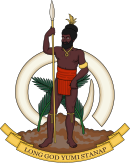Our website is made possible by displaying online advertisements to our visitors.
Please consider supporting us by disabling your ad blocker.
Politics of Vanuatu
This article needs additional citations for verification. (August 2020) |
 |
|---|
The politics of Vanuatu take place within the framework of a constitutional democracy. The constitution provides for a representative parliamentary system. The head of the Republic is an elected president. The prime minister of Vanuatu is the head of government.
Executive power is exercised by the government. Legislative power is vested in both the government and parliament. The Judiciary is independent of the executive and the legislature.
These institutions, which date from the country's independence in 1980, exist alongside traditional systems of leadership and justice upheld by community chiefs.
Vanuatu is a democracy, whose political culture is different from that in most Western democracies, with strong elements of clientelism, corruption, and political debate that focuses strongly on the distribution of resources among communities. Governments typically comprise coalitions of numerous small parties which change regularly, with parties and MPs "crossing the floor" and prime ministers frequently being ousted in motions of no confidence.
Major political issues in Vanuatu include: customary land rights, foreign investment and the sale of citizenship to foreigners, infrastructure development, recognition of West Papua, response to natural disasters and climate change, the tackling of instability and corruption, and the safeguarding of the country's cultural heritage.
Previous Page Next Page


